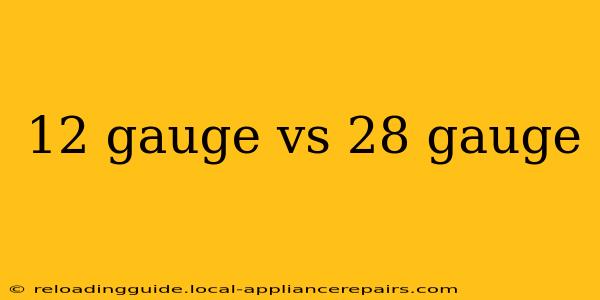Choosing the right shotgun can feel overwhelming, especially when faced with the vast array of gauges available. Two popular choices for both hunters and sport shooters are the 12 gauge and the 28 gauge. This article will delve into the key differences between these two gauges, helping you determine which one best suits your needs and shooting style.
Gauge Explained: Understanding the Numbers
Before diving into the specifics of 12 gauge vs. 28 gauge, it's important to understand what "gauge" actually means. The gauge of a shotgun refers to the number of lead balls, each with a diameter equal to the inside diameter of the barrel, that would weigh one pound. Therefore, a 12-gauge shotgun means that twelve lead balls of the barrel's diameter would weigh one pound. A smaller gauge number indicates a larger diameter barrel and thus a larger shell.
12 Gauge: The Workhorse
The 12 gauge is the undisputed king of shotguns. Its popularity stems from its versatility and power.
Advantages of a 12 Gauge:
- Power and Range: The larger shell size allows for significantly more shot and powder, resulting in greater power and longer effective range. This makes it ideal for hunting larger game at longer distances.
- Wide Availability of Ammunition: Finding 12 gauge ammunition is never a problem, regardless of your location or the type of shot you need (birdshot, buckshot, slugs).
- Variety of Chokes: A wide range of chokes is available for 12 gauge shotguns, allowing for precise shot pattern adjustments for various hunting situations and target types.
- Recoil Management Options: While recoil can be significant, advancements in stock design and recoil reduction systems have made 12 gauges manageable even for smaller shooters.
Disadvantages of a 12 Gauge:
- Recoil: The considerable recoil can be fatiguing, especially during extended shooting sessions. This can be a significant drawback for less experienced shooters or those with physical limitations.
- Weight: 12 gauge shotguns tend to be heavier than their smaller gauge counterparts, leading to more fatigue during hunting trips.
- Cost: While ammunition is widely available, the sheer volume needed for practice and hunting can add up.
28 Gauge: The Lightweight Champion
The 28 gauge is gaining popularity as a versatile option for those seeking a lighter and gentler shooting experience.
Advantages of a 28 Gauge:
- Reduced Recoil: The smaller shell size leads to significantly less recoil, making it an excellent choice for new shooters, smaller individuals, and those looking for a more comfortable shooting experience.
- Lighter Weight: 28 gauge shotguns are generally lighter, resulting in less fatigue during long shooting sessions.
- Improved Handling: The lighter weight and reduced recoil contribute to improved handling and quicker target acquisition.
Disadvantages of a 28 Gauge:
- Limited Range and Power: Compared to the 12 gauge, the 28 gauge has a shorter effective range and less stopping power, making it less suitable for hunting larger game or at longer distances.
- Ammunition Availability: While becoming more readily available, finding 28 gauge ammunition might be more challenging than finding 12 gauge ammunition in some areas.
- Cost: Ammunition costs for 28 gauge can sometimes be disproportionately higher compared to 12 gauge.
Which Gauge is Right for You?
The best choice ultimately depends on your individual needs and shooting style:
-
Choose a 12 gauge if: You need maximum power and range, hunt larger game, require a wide range of ammunition choices, or prioritize versatility.
-
Choose a 28 gauge if: You prioritize reduced recoil and lighter weight, are a new shooter or have physical limitations, prefer a more comfortable shooting experience, and primarily hunt smaller game at closer ranges.
Ultimately, the best way to decide is to try both gauges if possible at a shooting range. This hands-on experience will help you determine which shotgun fits your body, shooting style, and hunting needs perfectly.

